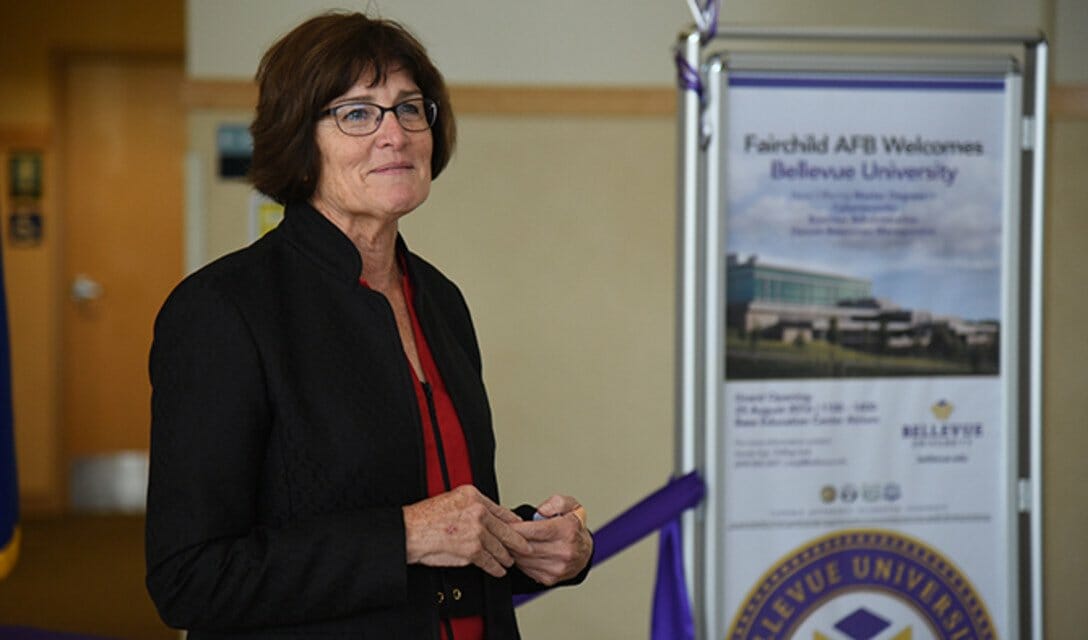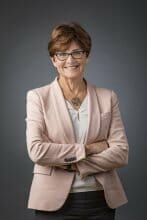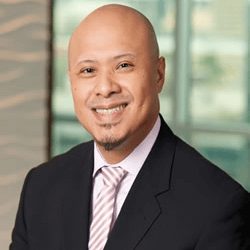
Dr. Mary Hawkins joined Bellevue University in 1995 as Vice President for Enrollment and Outreach and was named the University’s fourth president in 2009. Since her arrival, Bellevue University has changed dramatically in enrollment, geographic reach, scope of programs and services, and in the strong national, international, corporate, and community partnerships it is developing.
During her tenure, Bellevue University has experienced record enrollment growth and has been consistently recognized as one of the nation’s best institutions for working adults and military personnel. Dr. Hawkins is credited with establishing Bellevue University’s “Real Learning for Real Life” applied learning approach that helps undergraduate, graduate and doctoral-level students master in-demand professional skills and knowledge. Her keen interest and focus on the needs of working mothers, military spouses and those juggling careers and families while pursuing their education has led the University to continually innovate in ways that provide students with access, as well as the opportunity to advance and make a better life for their families.
Dr. Emad Rahim: How did you get started in your career as a University President?
Dr. Mary Hawkins: I was identified in the succession plan for the previous President. The Board had their eye on me longer than I realized. I had developed a long history at the institution of working in and across multiple departments. Like many Presidents, it was not in my career plan, but circumstances and opportunities evolved to create this path. Initially, I wasn’t sure I wanted the job but, I also didn’t want to risk getting a new boss who would not give me the freedoms and responsibility I had. So, when the time came, I took the job.
E. R: What is your leadership style and management principles for success?
M. H: I strongly believe that the most important thing I do is build and sustain the culture that empowers us to fulfill our mission and vision. I want our culture to be one in which all employees can take initiative for driving the institution forward. I believe there are many ways to accomplish our goals and our mission. When I see that employees get it and want to be strong contributors, I try to make sure they have a clear sense of what to do and the resources, attitude and enthusiasm to achieve their goals. We are entrepreneurial and innovative and we want to stay that way.
E. R: Please tell us a little about Bellevue University and its mission.
M. H: Bellevue University believes that everyone, regardless of their status or circumstance, should have the opportunity to earn a quality college degree with the skills and engagement needed to open the door to a promising career and a high quality of life. Unlike many universities that define success in terms of admissions exclusivity and selectivity, we choose to define our success as providing access with performance to many, regardless of their chosen path in life. Our mission, to provide career-oriented, cost-effective, open access education, and our vision, to boldly adapt and innovate so our students and our institution can be wildly successful, keep us focused on our goals.
E. R: How did the University get started? And is it true that Bellevue University was the first to offer a fully online MBA program in the United States?
M. H: We were founded in 1966 through the efforts of military and community leaders who wanted a college built for working adults and military members.

And, yes, according to our research and feedback from early online pioneers, Bellevue University was the first college to offer a fully online MBA.
E. R: How are your programs and faculty preparing students for the global economy?
M. H: We focus on developing programs in areas that prepare students for career opportunities in strong, growing and emerging markets. We conduct research on the skills and knowledge needed in those jobs and validate our research with our industry advisory committees. Our programs are based on relevant, real-world learning outcomes that position our graduates for career and personal success.
E. R: Now that more universities are going online and catering to adult students, what makes your virtual platform and nontraditional programs unique from other institutions?
M. H: Bellevue University has long recognized the importance of applied learning for adults. We are committed to creating active learning experiences for our students. We try to incorporate assignments that relate to the real world application of the material being studied so that the learning is relevant, and so students can see immediate application to the field or work environment. We also keep our classes are small, generally around 20-24 students. We encourage students and faculty to share examples from the workplace and to learn from the diverse and rich experiences of their classmates and instructors.
E. R: University faculty play a critical role in the development of your students’ learning and in helping build their professional competencies. What types of things are your faculty involved in? What are they doing that makes their classroom unique to the learning experience?
M. H: Faculty members are selected based on academic and professional qualifications. It is important to us and to our students that faculty bring their real world experience to the classroom. We are proud that many of our faculty are actually working full-time in their fields. Their experience is highly valued and has a strong impact on learning at Bellevue University.
E. R: What type of qualifications and experiences do your faculty bring to the classroom and programs? How do your college deans make sure they stay updated in their area of expertise and field of study?
M. H: By contract, faculty must engage in professional development. We have a rich array of activities and initiatives that our faculty engage in, from serving on boards, participating in certifications and specialized accreditation, partnering with youth organizations and secondary schools to host clinics, competitions and camps. As well, faculty often present at and/or attend conferences and symposia in their fields of study. A notable example is in the Project Management program that Dr. Emad Rahim oversees. He is well known and active in the field of project management, but he’s also an entrepreneur. He is constantly exploring, educating himself, speaking to audiences, and looking for ways to make the programs that he heads up more relevant to students who want to enter the project management field or advance within their current organizations.
E. R: Do students at the university have input on faculty promotions, awards and recognition programs? If so, can you expand on this and provide examples?
M. H: Yes, students are encouraged to nominate faculty members for awards and their feedback is included in the promotion packages of our faculty.
E. R: We learned a great deal about you and Bellevue University. If I was a potential corporate partner that was choosing between two different universities for my employees, what other things would you want me to know about your programs to help with my selection?
M. H: Our programs are created with the real world in mind. We don’t create them by ourselves in an ivory tower. Instead, we place a great deal of emphasis on building high value learning networks and relationships that ultimately improve the performance of higher education.
The other thing that our partners know and appreciate about us is our integrity. The people of Bellevue University, and the institution, follow through on our commitments.
Other interviews
Interview With Michelle Kempke Eppler Vice President at Bellevue University
An interview with Thomas Cavanagh

Dr. Emad Rahim is an award-winning entrepreneur, educator, author, community leader and TEDx Speaker. He currently serve as the Endowed Entrepreneur-in-Residence at Oklahoma State University and teaches at the Jack Welch Management Institute in the Executive MBA program. He was recognized by the United Nations Foundation as a 2013 Empact100 Honoree for his social entrepreneurship work, received a Congressional Award for his community service and was the recipient of the Forty Under 40 Business Leadership Award sponsored by Syracuse University. His personal story was turned into a short documentary, “Against the Odds,” and featured in the Huffington Post and Forbes. He co-authored “Leading Through Diversity: Transforming Managers Into Effective Leaders” and “The 4-Tions: Your Guide to Developing Successful Job Search Strategies” and is a frequent contributor to the Refractive Thinker book series, CEO Magazine, TweakYourBiz and YFS Entrepreneurship Magazine. Fellow him on Twitter @DrEmadRahim




























